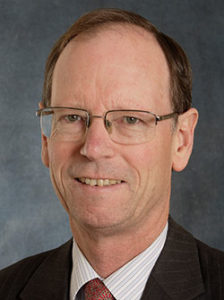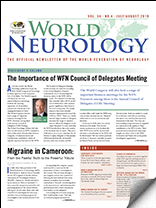It has been a great privilege to be treasurer of WFN since 2015. During this time, I have been delighted to see the finances of the federation become even stronger.

Richard Stark
WFN’s mission statement is: “… to foster quality neurology and brain health worldwide, a goal we seek to achieve by promoting global neurological education and training, with the emphasis placed firmly on underresourced parts of the world.”
I strongly support these aims, and my experience on the board of trustees for the past four years confirms that it is applied in practice.
The role of the treasurer is to advise the other trustees about the state of the finances, and thus which programs can be supported. For example, one of our current major programs involves supporting training in Africa and Latin America. The impact on the budget extends for some years into the future. We must be confident that our position is sound (and will remain so) in order to make the commitment to support training for up to four years in the future.
The income stream for WFN derives in part from member society fees and royalties from the Journal of Neurological Sciences (which are both relatively stable), and more substantially from the Congress (WCN), which is much more volatile. The 2015 meeting in Santiago significantly exceeded expectations, and the Kyoto meeting in 2017 was an outstanding financial success. As treasurer, I must thank all those involved in those meetings for working so hard to ensure success. Early projections for Dubai 2019 are positive also.
The financial success of WCN depends largely on the support from pharmaceutical companies, which depends, in turn, on the stage of commercial development of their products. These factors are outside our control. The management of the WFN’s finances, therefore, requires an astute and flexible approach, efficient administration, and conservative estimation of projected income streams.
My experience over the past four years has helped me to have a more indepth understanding of these issues and should be helpful to the WFN over the next four years. I believe, therefore, that I have something of substance to offer if elected.
I should set out some aspects of my background that have relevance to the position of treasurer of WFN. These include:
- treasurer of the Sydney 2005 WCN, which was a huge financial success
- treasurer of the Australian Association of Neurologists (1997-2003)
WCN 2005 took place at a time of substantial exchange rate volatility, and the strategies designed to minimize adverse impacts of this contributed to the financial success of the conference. Subsequent experience as treasurer of WFN over the past four years (with the impact of Brexit) has reinforced the necessity to have funds diversified in such a way as to minimize volatility while not excluding the possibility of organic growth.
The WFN has a strong tradition of efficient use of funds. This relies on the generous donation of time from the executive as well as the hard work of administrative staff. This efficiency must continue. If elected to a further term, I undertake to continue to work diligently with the executive to ensure that the financial management of the WFN allows it to pursue its aims and objectives.
